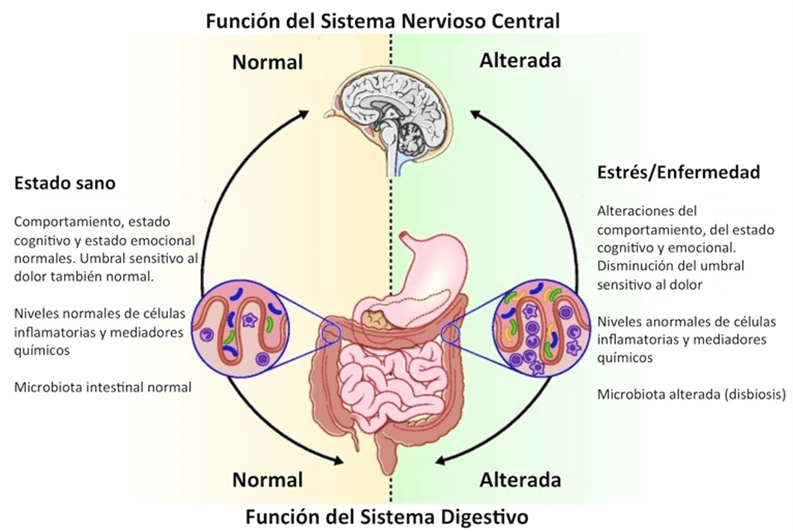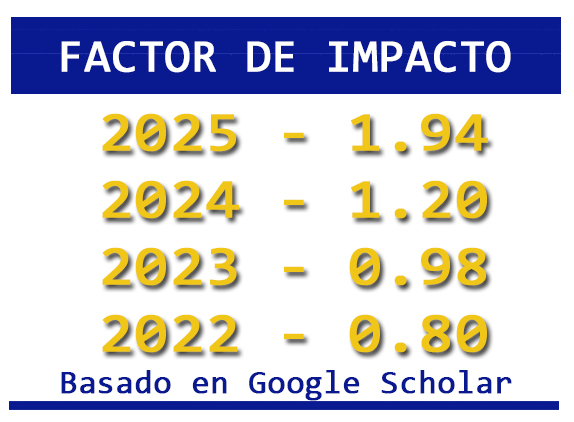The Second Brain: The Connection Between Gut Microbiota and Mental Health
DOI:
https://doi.org/10.36790/epistemus.v19i38.421Keywords:
Gut Microbiota, Mental Health, Gut-Brain, Neurotransmitters, ProbioticsAbstract
Gut microbiota has emerged as a key component in the regulation of human mental health, mediating processes through the gut-brain microbiota axis. This article aims to analyze the relationship between the gut and the brain, highlighting the mechanisms by which gut microbiota influences mood, behavior, and various neuropsychiatric disorders. To achieve this, the role of the enteric nervous system, neurotransmitter production, and the impact of factors such as diet, stress, and the use of probiotics are reviewed. The findings suggest that maintaining a proper balance in gut microbiota not only supports digestive health but may also be a determining factor in the prevention and complementary treatment of mental disorders, reinforcing the concept of the gut as a “second brain” with direct influence on our emotional well-being.
Downloads
References
M. D. Gershon, The Second Brain: A Groundbreaking New Understanding of Nervous Disorders of the Stomach and Intestine, HarperCollins, Noviembre 1999.
R. Campo-Moreno, T. Alarcón-Cavero, G. D’Auria, S. Delgado-Palacio, y M. Ferrer-Martínez, “Microbiota en la salud humana: técnicas de caracterización y transferencia,” Elsevier España, vol. 36, núm. 4, pp. 241-245, Abril 2018. DOI: 10.1016/j.eimc.2017.02.007
J. Sebastián-Domingo, y C. Sánchez-Sánchez, “De la flora intestinal al microbioma. Revista Española de Enfermedades Digestivas,” Revista Española de Enfermedades Digestivas, vol. 110, núm. 1, pp. 51-56, Diciembre 2018. DOI: https://dx.doi.org/10.17235/reed.2017.4947/2017
R. Garza, S. Garza y L. Perea, “Microbiota intestinal: aliada fundamental del organismo humano,” Educación química, vol. 32, no. 1, pp. 10-19, Agosto 2021. DOI: https://doi.org/10.22201/fq.18708404e.2021.1.75734
M. E. Icaza-Chávez, “Microbiota intestinal en la salud y la enfermedad,” Revista de Gastroenterología de México, vol. 78, núm. 4, pp. 240-248, Diciembre 2013. DOI: 10.1016/j.rgmx.2013.04.004
J. Cryan, K. O’riordan, C. Cowan, K. Sandhu, T. Bastiaanssen, M. Boehme, M. Codagnone, S. Cussotto, C. Fulling, A. Golubeva, K. Guzzetta, M. Jaggar, C. Long-Smith, J. Lyte, J. Martin, A. Molinero-Perez, G. Moloney, E. Morelli, E. Morillas, R. O’Connor, J. Cruz-Pereira, V. Peterson, K. Rea, N. Ritz, E. Sherwin, S. Spichak, E. Teichman, M. van de Wouw, P. Ventura-Silva, S. Wallace-Fitzsimons, N. Hyland, G. Clarke y T. Dinan, “The microbiota-gut-brain axis,” Physiological Reviews, vol. 99, no. 4, pp. 1877-2013, Octubre 2019. DOI: https://doi.org/10.1152/physrev.00018.2018
M. Saraf, B. Piccolo, A. Bowlin, K. Mercer, T. LeRoith, S. Chintapalli, K. Shankar, T. Badger y L. Yeruva, “Formula diet driven microbiota shifts tryptophan metabolism from serotonin to tryptamine in neonatal porcine colon,” Microbiome, vol. 5, no. 1, pp. 1-13, Julio 2017. DOI: https://doi.org/10.1186/s40168-017-0297-z
K. Yoshii, K. Hosomi, K. Sawane y J. Kunisawa, “Metabolism of dietary and microbial vitamin b family in the regulation of host immunity,” Frontiers in Nutrition, vol. 6, pp. 1-13, Abril 2019. DOI: https://doi.org/10.3389/fnut.2019.00048
B. Ramakrishna, “Role of the gut microbiota in human nutrition and metabolism," Journal of Gastroenterology and Hepatology, vol. 28, pp. 9-17, Diciembre 2013. DOI: 10.1111/jgh.12294
C. Cortés, A. Escobar, J. Cebada, G. Soto, T. Bilbao y M. Vélez, “Estrés y cortisol: implicaciones en la ingesta de alimento,” Revista Cubana de Investigaciones Biomédicas, vol. 37, no. 3, pp. 1-15, 2018. ISSN: 1561-3011
M. Gómez-Eguílaz, J. L. Ramón-Trapero, L. Pérez-Martínez y J. R. Blanco, “El eje microbiota-intestino-cerebro y sus grandes proyecciones,” Rev. Neurol, vol. 68, núm. 3, pp. 111-117, Febrero 2019. PMID: 30687918
M. Peñafiel, y K. Novo, “Eje intestino-cerebro y su impacto en el estrés,” RECIAMUC, vol. 7, núm. 2, pp. 576-584, Junio 2023. DOI: https://doi.org/10.26820/reciamuc/7.(2).abril.2023.576-584
J. Álvarez, J. Real, F. Guarner, M. Gueimonde, J. Rodríguez, M. De Pipaón, y Y. Sanz, “Microbiota intestinal y salud,” Gastroenterología y Hepatología, vol. 44, núm. 7, pp. 519-535, Septiembre 2021. DOI: 10.1016/j.gastrohep.2021.01.009
H. Kaur, C. Bose y S. Mande, “Tryptophan Metabolism by Gut Microbiome and Gut-Brain-Axis: An in silico Analysis,” Frontiers in Neuroscience, vol. 13, núm. 1365, Diciembre 2019. DOI: 10.3389/fnins.2019.01365
Z. Barandouzi, J. Lee, M. del Carmen, J. Chen, W. Henderson, A. Starkweather y X. Cong, “Associations of neurotransmitters and the gut microbiome with emotional distress in mixed type of irritable bowel syndrome,” Sci Rep, vol. 12, pp 1-8, Enero 2022. DOI: https://doi.org/10.1038/s41598-022-05756-0
Y. Orbe-Orihuela, J. Hernández-Mariano, A. Castañeda-Márquez, y A. Alvarado-Delgado, “Microbiota intestinal y su relación con la salud mental,” XIKUA Boletín Científico de la Escuela Superior de Tlahuelilpan, vol. 12, núm. 23, pp. 69-75, Enero 2024. DOI: https://doi.org/10.29057/xikua.v12i23.11673
P. Strandwitz, “Neurotransmitter modulation by the gut microbiota,” Brain Research, vol. 1693, pp. 128-133, Agosto 2018. DOI: https://doi.org/10.1016/j.brainres.2018.03.015
G. Álvarez, F. Guarner, T. Requena, y M. Ascensión, “Dieta y microbiota. Impacto en la salud,” Nutrición Hospitalaria, vol. 35, núm. 6, pp. 11-15, Julio 2020. DOI: https://dx.doi.org/10.20960/nh.2280
F. Jiménez-Trejo, “Coevolución microbiota-humano y sus implicaciones en salud: de cazadores-recolectores a sedentarios industrializados,” Revista del Centro de Investigación de la Universidad La Salle, vol. 14, núm. 56, pp. 1-16, Diciembre 2021. DOI: http://doi.org/10.26457/recein.v14i56.2859
R. Kelly, Y. Borre, C. O' Brien, E. Patterson, S. El Aidy, J. Deane, P. J. Kennedy, S. Beers, K. Scott, G. Moloney, A. E. Hoban, L. Scott, P. Fitzgerald, P. Ross, C. Stanton, G. Clarke, J. F. Cryan, y T. G. Dinan, “Transferring the blues: Depression-associated gut microbiota induces neurobehavioural changes in the rat,” Journal of Psychiatric Research, vol. 82, pp. 109-118, Noviembre 2019. DOI: 10.1016/j.jpsychires.2016.07.019
L. Fuenmayor-González, T. Fajardo-Loaiza, J. Rivadeneira-Dueñas, y J. Arévalo-Mancheno, “Microbiota, probióticos y el comportamiento humano,” Revista Vive, vol. 5, núm. 13, pp. 75-86, Febrero 2022. DOI: https://doi.org/10.33996/revistavive.v5i13.1132
C. Scorza, C. Piccini y P. Zunino. "Microbiota intestinal, probióticos y salud mental," Revista de Psiquiatría del Uruguay, vol. 83, núm. 1, pp. 33-42, Octubre 2019. Recuperado de: http://spu.org.uy/sitio/wp-content/uploads/2019/10/04_REV_02.pdf
C. Wallace, y R. Milev, “Los efectos de los probióticos sobre los síntomas depresivos en humanos: una revisión sistemática,” Ann Gen Psychiatry, vol. 16, núm. 14, Febrero 2017. DOI: https://doi.org/10.1186/s12991-017-0138-2
D. Silva, B. Vicente y M. Valdivia, “Factor neurotrófico derivado del cerebro como marcador de conducta suicida en pacientes con trastorno depresivo mayor,” Revista chilena de neuro-psiquiatría, vol.53, no. 1, pp. 44-52, Marzo 2015. DOI: https://dx.doi.org/10.4067/S0717-92272015000100006
A. Gómez-López, “Microbioma, salud y enfermedad: probióticos, prebióticos y simbióticos,” Biomédica, vol. 39, núm. 4, pp. 617-621, Diciembre 2019. PMID: 31860173
J. Gao, L. Zhao, Y. Cheng, W. Lei, Y. Wang, X. Liu, N. Zheng, L. Shao, X. Chen, Y. Sun, Z. Ling, y W. Xu, “ Probiotics for the treatment of depression and its comorbidities: A systemic review,” Frontiers in cellular and infection microbiology, vol. 13, pp. 2-4, Abril 2023. DOI: https://doi.org/10.3389/fcimb.2023.1167116
C. Castañeda, “Microbiota intestinal y trastornos del comportamiento mental,” Revista Cubana de Pediatría, vol. 92, núm. 2, Abril 2020. ISSN: 1561-3119
K. Hashimoto, “Emerging role of the host microbiome in neuropsychiatric disorders: overview and future directions,” Mol Psychiatry, vol. 28, pp. 3625-3627, Octubre 2023. DOI: https://doi.org/10.1038/s41380-023-02287-6
C. Lin, H. Yang y H. Lane, “D-glutamate, D-serine, and D-alanine differ in their roles in cognitive decline in patients with Alzheimer’s disease or mild cognitive impairment,” Pharmacology, Biochemistry and Behavior, vol. 185, pp. 1-6, Octubre 2019. DOI: https://doi.org/10.1016/j.pbb.2019.172760
V. Nikolova, M. Smith, L. Hall, J. Cleare, J. M. Stone y A. Young, “Perturbations in gut microbiota composition in psychiatric disorders: a review and meta-analysis,” JAMA Psych, vol. 78, pp. 1343-1354, Septiembre 2021. DOI: https://doi.org/10.1001/jamapsychiatry.2021.2573
S. Kumari, R. Taliyan y S. Dubey, “Comprehensive review on potential signaling pathways involving the transfer of α-synuclein from the gut to the brain that leads to Parkinson’s disease,” ACS Chem Neurosci, vol. 14, pp. 590-602, Febrero 2023. DOI: https://doi.org/10.1021/acschemneuro.2c00730

Downloads
Published
How to Cite
Issue
Section
License
Copyright (c) 2025 EPISTEMUS

This work is licensed under a Creative Commons Attribution-NonCommercial-ShareAlike 4.0 International License.
The magazine acquires the patrimonial rights of the articles only for diffusion without any purpose of profit, without diminishing the own rights of authorship.
The authors are the legitimate owners of the intellectual property rights of their respective articles, and in such quality, by sending their texts they express their desire to collaborate with the Epistemus Magazine, published biannually by the University of Sonora.
Therefore, freely, voluntarily and free of charge, once accepted the article for publication, they give their rights to the University of Sonora for the University of Sonora to edit, publish, distribute and make available through intranets, Internet or CD said work, without any limitation of form or time, as long as it is non-profit and with the express obligation to respect and mention the credit that corresponds to the authors in any use that is made of it.
It is understood that this authorization is not an assignment or transmission of any of your economic rights in favor of the said institution. The University of Sonora guarantees the right to reproduce the contribution by any means in which you are the author, subject to the credit being granted corresponding to the original publication of the contribution in Epistemus.
Unless otherwise indicated, all the contents of the electronic edition are distributed under a license for use and Creative Commons — Attribution-NonCommercial-ShareAlike 4.0 International — (CC BY-NC-SA 4.0) You can consult here the informative version and the legal text of the license. This circumstance must be expressly stated in this way when necessary.
The names and email addresses entered in this journal will be used exclusively for the purposes established in it and will not be provided to third parties or for their use for other purposes.














